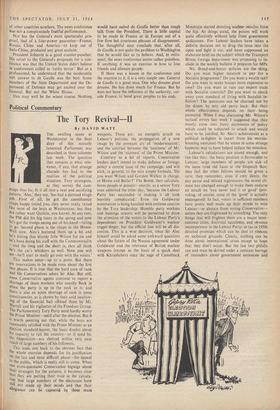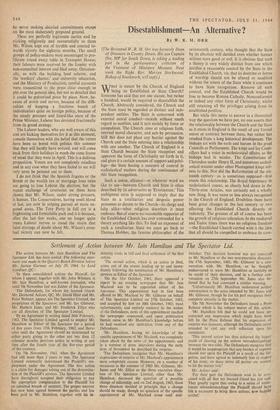Political Commentary
The Tory Revival II
By DAVID WATT, THE swelling scene at Westminster in the final days of this scarcely lamented Parliament was described in these columns last week. The question that remains is what rele- vance, if any, that strange charade has had to the realities of the political situation. Tory strategists, as they survey the cam- paign thus far, fit it all into a neat and satisfying Pattern. 'Alec,' they say, 'has had a damned tough /ob. First of all, he got the constituency chaps happy (mind you, they never really ratted like most of the boys at Westminster, but they did rather want Quintin, you know). At any rate, the PM did his big tours in the spring and now he's got the troops eating out of his hand—raring to go. Second phase is the chaps, in the House. Well now, Alec's buttered them up a bit and he's hitting that bloody little Wilson for six and he's been doing his stuff with the Commonwealth --and the long and the short is, they all think he's the cat's whiskers as well. Now you will see—he'll start to really go over with the voters.'
This makes sense—up to a point. But there are reservations to be made even about the first two phases. It is true that the hard core of rank and file Conservatives adore Sir Alec. But still, some Conservative agents continue to report a shortage of those workers who usually flock in When the party is up to the neck in it; and there is also an acute shortage of cash in some. Constituencies, as is shown by their avid swallow- ing of the financial bait offered them by Mr. Martell and his vigilantes of the Freedom Group. The Parliamentary Tory Party need hardly worry the Prime Minister—until after the election. But it is worth, pointing out that, while the boys are reasonably satisfied with the Prime Minister as an election standard-bearer, the basic doubts about his capacity to run the country—or if need be, the Opposition—are shelved within very easy reach of large numbers of his followers.
This leads one back to the obvious fact that the whole exercise depends for its justification °n the last and most difficult phase—the appeal to the public, which is really still to come. When one cross-questions Conservative bigwigs about their strategies for the autumn, it becOmes clear that they are putting their trust in the calcula- tion that large numbers of the electorate ha:ire Still not made up their minds and that their allegiance can be captured by three main
weapons. These are: an energetic attack on Labour's policies; the propagation of a new image by the constant cry of `modernisation'; and the contrast between the 'nastiness' of Mr. Wilson and the 'niceness' of the Prime Minister.
Contrary to a lot of reports, Conservative leaders don't intend to make defence or foreign policy a central issue of the campaign, and will stick, in general, to the nice simple formula, 'Do you want Wilson and Gordon Walker in charge, or HOme and Butler?' The Bomb, they calculate, bores people at present—mostly, as a senior Tory man admitted the other day, 'because the Labour Party has succeeded in making it all look horribly complicated.' Even the Goldwater nomination is being handled with extreme caution by the Tory leadership. Humble party workers and hustings orators will be permitted to draw the attention of the voters to the Labour Party's dependence on President Goldwater's nuclear trigger-finger, but the official line will be all dis- cretion. This is a wise decision, since Sir Alec himself could be asked some awkward questions about the future of the Nassau agreement under Goldwater and the relevance of British. nuclear weapons (except as the basis of a quick deal with Khrushchev) once the sage of Camelback
. .
Mountain started shooting nuclear missiles ftom the' hip. As things stand, the poison will work quite effectively without help from government spokesmen. For Labour leaders have taken a • definite decision not to drag the issue into the open and fight it out, and have suppressed an elaborate brief on the subject which the TranspOrt House foreign department was proposing to in- clude in the weekly bulletin it prepares for MPs.
No. Bread-and-butter policies are the thing. Do you want higher taxation to pay for a Socialist programme? Do you want a wealth tax? Do you want to make houses more expensive to own? Do you want to ruin our export trade with Socialist controls? Do you want to chuck away your standard of living with SocialiSt in- flation? The questions can be churned out by the dozen by any old party hack. But their whole effectiveness depends on their being answered. When I was discussing Mr. Wilson's tactical errors last week I suggested that they mostly arose over hasty statements of policy which could be subjected to attack and would have to be justified. Sir Alec's achievement as a political in-fighter is (apart from his morale- boosting exercises) that he seems in some strange hypnotic way to have helped induce the mistakes.
Labour's calculations are sound enough, and run like this: the basic position is favourable to Labour; large numbers of people are sick of the same tired old faces at the Dispatch Box; they feel the other fellows should be given a turn; they remember, even if only dimly, the pay pause and related nightmares; the moral cli- mate has changed enough to make them endorse an attack on 'you never had it so good' (pro- viding, of course, none of the 'good' is actually endangered). In fact, voters in sufficient numbers have pretty well made up their minds to vote Labouror abstain from voting Conservative— unless they are frightened by something. The only things that will frighten them are a major inter- national crisis, doctrinal squabbles, and obvious incompetence in the Labour.Party; or (as in 1959) detailed promises which can be shot to ribbons on technical grounds. Clearly, nothing can be done about international crises except to hope that they don't occur. But the last two pitfalls can and must be skirted under a constant barrage of reminders ab6ut government omissions and by never making detailed commitments except on the most elaborately prepared ground.
These are perfectly legitimate tactics and by sticking religiously and resourcefully to them Mr. Wilson kept out of trouble and coasted to- wards victory for eighteen months. The small groups of policy-makers were encouraged to pro- liferate round every table in Transport House; their labours were received by the Leader with non-committal interest and filed away. Occasion- ally, as with the building land scheme, and the 'workers' charter,' and university education, and the Ministry of Production, careful accounts were transmitted to the press clear enough to pia over the general idea, but not so detailed that it could be pulverised piece by piece. Now, be- cause of strain and nerves, because of the diffi- culties of keeping a fractious bunch of individualists quiet on foreign policy, because of the steady pressure and lizard-like stare of the Prime Minister, Labour has deviated fractionally from its grand strategy.
The Labour leaders, who are well aware of this and are kicking themselves for it at this moment, console themselves with the belief that the voters have been so bored with politics this summer that they will hardly have noticed, and will come back from their holidays in much the same frame of mind that they were in April. This is a dubious proposition. Voters are not completely mindless and in any case what they have failed to see will very soon be pointed out to them.
I do not think that the Spanish frigates or the Bomb or the wealth tax or mortgage loan rates are going to lose Labour the election, but the recent exchange of courtesies on them have shown that Mr. Wilson, under strong pressure, is human. The Conservatives, having smelt blood at last, are now in yelping pursuit of more ex- posed areas. The Tory Party in full cry is a frightening and formidable pack and it is because, after the last few weeks, one no longer quite trusts Labour nerves to stand the strain that faint stirrings of doubt about Mr. Wilson's even- tual victory can now be felt.































 Previous page
Previous page